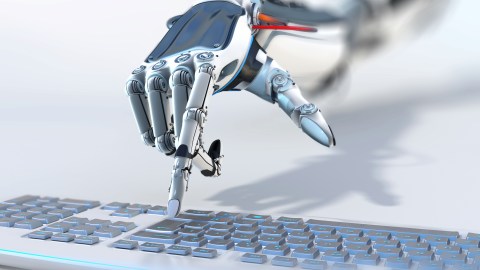Using Trial and Error, New Robot Can Learn Independently

Smart, humanlike robots are fixtures of science fiction literature and film. They range from benevolent co-conspirators (Robot And Frank) to violent revolutionaries (I, Robot). These contrasting portrayals of artificial intelligence fill us with a mixture of optimism and apprehension; having a robot companion would be fun, but cynics are quick to point out that seemingly friendly machines could turn on us at any time.
Researchers at Berkeley have created a robot whose behaviors are similar to a human child’s. Through a process known as “deep structured learning,” BRETT (Berkeley Robot for the Elimination of Tedious Tasks) can adapt to its environment independently, but let’s hope temper tantrums don’t make their way into its programming.
“What we’re reporting on here is a new approach to empowering a robot to learn,” said Professor Pieter Abbeel, professor of electrical engineering and computer sciences. “The key is that when a robot is faced with something new, we won’t have to reprogram it. The exact same software, which encodes how the robot can learn, was used to allow the robot to learn all the different tasks we gave it.”
While the “elimination of tedious tasks” sounds like a prohibitively ambitious goal, BRETT is a fascinating piece of technology that exhibits remarkable ability to adapt. Video footage shows BRETT assembling towers of blocks entirely on its own. The robot learned after spending time in an environment with children’s toys.
While the makers of BRETT aspire to provide convenience in workplace settings, other pieces of technology designed with that same purpose in mind have fallen short of their aims. Costco announced plans to remove all self-checkout units from its stores, claiming that cashiers performed their duties more efficiently than self-service technology. Perhaps deep, structured learning will one day allow self-checkout units to better adapt to the varied needs and demands of their customers. Conversely, Costco’s decision could possibly be a vote of confidence in human workers’ abilities to outpace future automated systems.
Either way, while we often speculate on whether artificial intelligence would simplify or complicate our daily lives, innovations like BRETT remind us that the time for speculation will soon be over. We’re moving ever closer to a world in which humans will commonly work alongside robots, and the robots won’t be the only ones doing a lot of adapting. It’s natural for humans to feel excited about the possibilities, and maybe a little nervous, too.
Visit Design & Trend for more.




